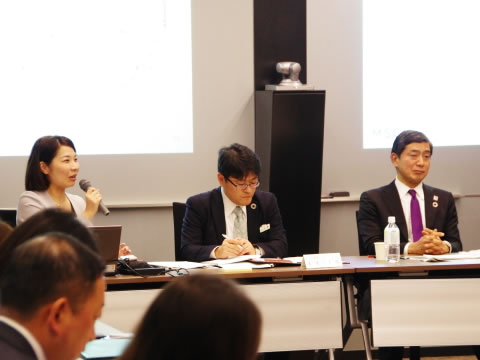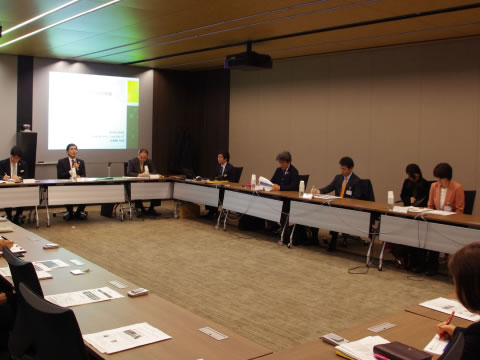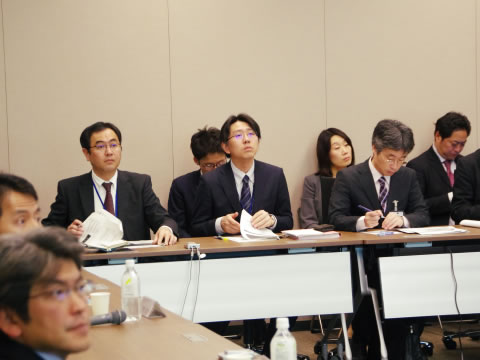Dialogue with Stakeholders
SMBC Group held a Stakeholder Dialog session annually, as an opportunity to communicate with our stakeholders about the initiatives for sustainability that we should be pursuing as a financial group.
FY2017 Dialog: Toward a Sustainable Society-Expected Actions on SDGs and ESG for Financial Institutions
(January 18, 2018)
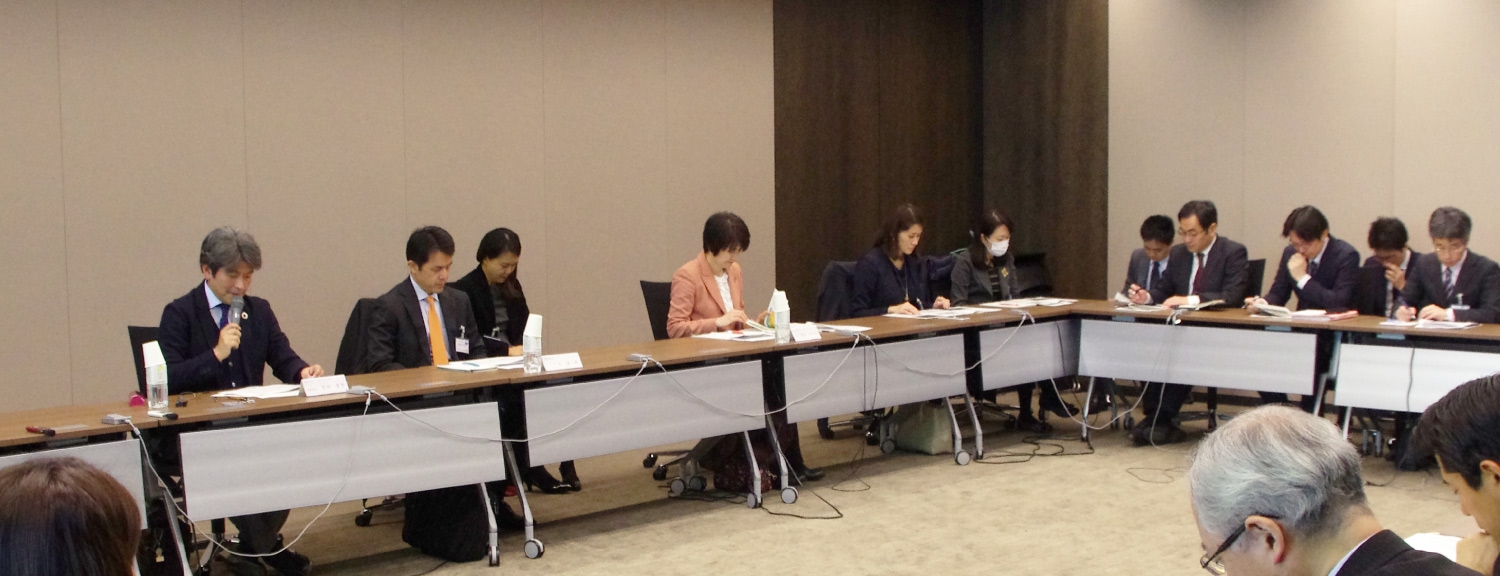
To understand and reaffirm our expected role, and the worldwide trend to achieve SDGs (Sustainable Development Goals) and ESG (Environment, Social, and Governance from the investor’s perspective), we received lectures from experts in respective areas, followed by a panel discussion.
* Participant’s name of company and titles are as of the time of the event.
Experts who participated in the dialog
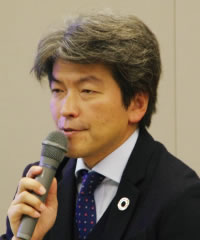
Mr. Keisuke Ota
General Manager
Global Compact
Network Japan
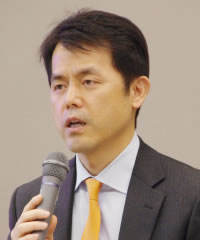
Mr. Seiichiro Uchi
Managing Director
MSCI Japan
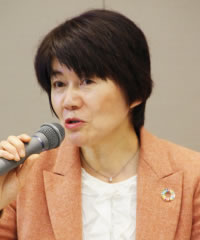
Ms. Kaori Kuroda
Executive Director
CSO Network Japan
SMBC Group participating companies
- Sumitomo Mitsui Financial Group
- Sumitomo Mitsui Banking Corporation
- SMBC Trust Bank
- Sumitomo Mitsui Finance and Leasing
- SMBC Nikko Securities
- Sumitomo Mitsui Card
- Cedyna
- SMBC Consumer Finance
- The Japan Research Institute
Understanding current situation and issues for approaches to SDGs and ESG
The session began with the three experts giving presentations containing analysis and opinions on how companies should approach to SDGs and ESG.
Summary of the presentations
Mr. Ota: “Transforming Our World: The 2030 Agenda for Sustainable Development (SDGs)”
-
The 17 goals of SDGs have a correlation between respective goals, affecting each other, therefore, companies need to view the big picture consider how to achieve them comprehensively.

The 17 goals of SDGs
- The key to approaching the SDGs is to first understand them, and then follow these steps in order: make priority decisions → determine objectives → integrate them into managements → disclose information.
- Expectations for the financial sector are extremely high, so we expect positive influences from financial sector to other non-financial sector companies.
Mr. Uchi: “Background of ESG Investment expansion”
- ESG is a crucial concept for protecting the interests of shareholders over the long term. When the sustainability of society increases, the beneficiaries are not only limited to shareholders, but also the people that obtain economic benefit from it. As a result, such approach contributes to make the entire society better.
- Although banks would prefer to emphasize their superior approaches of ESG, the products being provide are not always taking ESG into account. Simultaneously, it should be understood actively pursuing SDGs doesn’t necessarily lead to a high ESG evaluation of the company.
Ms. Kuroda: “Expectations for Companies approaches toward SDGs and ESG”
- Right now, the number of countries preparing national action plans in order to implement the U.N. Guiding Principles for Business and Human Rights are increasing, including Japan. As a member of a citizens’ organization, we are urging companies in various sectors to cooperate.
- It’s important for companies achieve SDGs through their main business, but simultaneously, we must always mind the impact to the most vulnerable members of society. Sometimes we cannot take care of such issues just through business. We therefore need to cooperate with various other sectors, including NPOs to creating links between business and social contribution activities.
Panel discussion following the presentations
During the panel discussion, the panelists responded to our various questions, by providing us valuable opinions and insights.
Questions from SMBC Group and the experts’ answers
Q.1 After setting goals for materiality (priority issues), how should we approach and work toward the SDGs?
Mr. Ota:
Ultimately, you need to incorporate them into your management. Through the lens of the SDGs, you need to focus on how to interpret your corporate philosophy in your own way. I think a way of using SDGs is to bring them to life in your day-to-day business and operations.
Q.2 SMBC Group has a long history facilitating social contributions activities, but our focus tends to be influenced by the direction of our main business. When the social issues cannot be solved through our main business, how should we balance the mixture of our business itself and our social contribution activities?
Ms. Kuroda:
It is the best if initiatives in your main business and community service are conducted on the same axis with a view to creating sustainable value. For issues that cannot be integrated into your main business, you should work with other companies, local governments, or NGOs. Otherwise, it is impossible to ensure “no one is left behind.”
Q.3 How do shareholders and capital markets view and evaluate the idea of companies engaging in non-business-related activities?
Mr. Uchi:
Investors obviously want you to take action that will improve your main business. In the case of social contribution activities, it’s important to make clear what the ultimate purpose of them are. The best is to make it clear that they are being conducted for the sake of the main business, and will become easier to organize the company’s actions eventually.
Q.4 How important is it to incorporate social contribution activities into figures such as KPIs (Key Performance Indicators)?
Mr. Uchi:
Investors managing huge portfolios can only evaluate a company using quantitative data. But sometimes the quantitative data doesn’t match the actual impression that the company has of itself, and in such cases, it’s effective for the company to disclose its “current situation and the vision it is striving to achieve for itself in the future.” Ultimately, that can serve as investment information.
Q.5 How should we handle actions on climate change and disclosures on related issues?
Mr. Uchi:
In the context of ESG investment, overseas investors place particular emphasis on “climate change”, and based on the understanding that the current pace of activity is not enough, countries are stepping up their efforts. If Japanese companies are slow to adapt, they will have to pay the cost of that, so their enterprise value globally will decline, and investment in companies that can’t follow that strategy will fall. The first thing you need to understand is that investors are not particularly sympathetic to the unique circumstances of Japan.
Q.6 Looking at the SDGs, I feel that a lot of them relate to overseas issues, but most of our group companies do most of their business in the domestic market, so it’s sometimes difficult to visualize them. For example, problems such as the rapid aging of Japan are not covered by the SDGs. The MDGs were focused on developing countries, but the SDGs also encompass advanced countries, but how should we view them?
Mr. Ota:
You can view the SDGs as being rooted in the MDGs, the idea of which was to help the most vulnerable people first. For Japan, too, it’s important not only for companies, but also for the national government to get involved by pulling everyone together to tackle tasks that are highly relevant to and can contribute to Japan.
Ms. Kuroda:
I feel that when they go onto the international stage, countries are getting better at putting on a good show about what they are doing. I really wonder whether Japan can just carry on like this. I sometimes think it’ll be difficult to do that unless Japan shows a more proactive attitude to get involved in rule-making. Japanese people should be made more aware of the rapid pace with which other Asian countries are moving to achieve the SDGs.
In response to the opinions

To meet the expectations, and to fulfill our role as a financial group, especially to achieve them though our main businesses, it will be important to get people actually in charge of business to understand them and get on board. Since adopting a proactive stance to tackling various social issues is a clear worldwide trend, top management are also conscious of the issues and will be aiming to pull everyone in our Group together to move forward in addressing them.
I also felt strongly that going forward it will be important to regularly communicate to the society and stakeholders about the action we are taking.
Masahiko Oshima
Senior Managing Executive Officer
Sumitomo Mitsui Banking Corporation
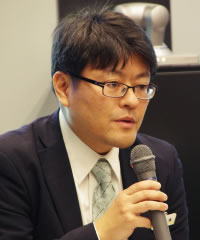
The opinions I’ve heard today were extremely valuable, and I feel that we’ve been told exactly what we need to do as a financial institution. We are engaged in various businesses, and with our customers working to achieve SDGs and meet ESG criteria, we also need to acquire knowledge, otherwise we will not be able to properly identify their needs. I also felt that within the Group, we need to make each and every employee aware of what needs to be done in the area of SDGs and ESG.
Takanobu Suehiro
General Manager, CSR Dept., Corporate Planning Dept.
Sumitomo Mitsui Financial Group

